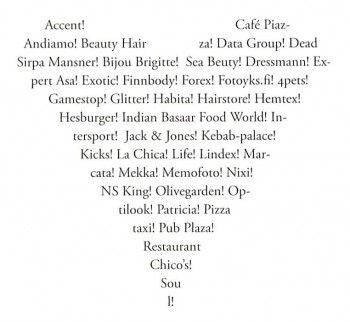Search results for "2010/02/let-us-eat-cake"
Pleased to see me?
16 July 2009 | Columns, Tales of a journalist
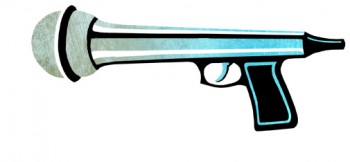
Illustration: Joonas Väänänen
When the Finnish media developed a crush on the country’s foreign minister, writes Jyrki Lehtola, no one could foresee the consequences. Especially if the object of their affections might begin to believe what they say about him…
It is a generally accepted truth that the spiteful media only raise people up in order to cast them down again a moment later.
Generally accepted truths are often not the case, although the media’s amorous relationships are, as a general rule, of short duration. More…
In the north
30 September 1988 | Archives online, Fiction, Prose
A short story from Luvaton elämä (‘Forbidden life’, 1987). Introduction by Tero Liukkonen
I
I went up north in a sleeping car. It was a relief to see that even in Tampere there was a sign on the car saying ‘Kemijärvi’. That meant I could sleep the whole way. I had the lower berth; a couple more like me were sleeping in the same compartment – just ordinary women. I was nevertheless silent and reserved, so that neither of them would want to make me into a travelling companion. And they did leave me in peace.
I read for a bit, till I began to feel more at home, and settled down to sleep with my woollen socks on. I deliberately went almost to sleep while not wanting to drop off completely; and I gradually reached a point where I didn’t know which direction the train was going in. That was liberating. It was all the same which direction we were going in. The motion of the train got through to my nerves and started releasing things. More…
Last flamenco in Seville
5 November 2010 | Fiction, poetry
The tragic story of a gypsy woman, famously transformed into an opera by Georges Bizet, inspired Saila Susiluoto to write about freedom in the contemporary world: her new collection of poems, entitled Carmen, is set in the shopping centre of an asphalt city. But is this classic femme fatale really a human being – or a cyborg, perhaps? Introduction by Teppo Kulmala
She was made of plastic strips, metal bits, artificial skin, implants, circuit boards. Her heart pumped blood like a real one, her eyes watered as necessary. She was made free and loving, and almost soulful. But the soul is a quirk, said the Creator, a human mistake causing pain and death. And confusion. And the degradation of this world. They left out what they couldn’t say, what they were unable to say. They said: your name is Carmen, go forth, find your balance on threads across the world, you are a meek machine, built to love everything except just one man. You are glowing wires, bright shiny strips of plastic, a mind made of images and tones, your step is light, go, go.
The mall’s scintillating youth choir
(gesticulating in the manner of a musical)
Gypsy life
21 March 2013 | Extracts, Non-fiction
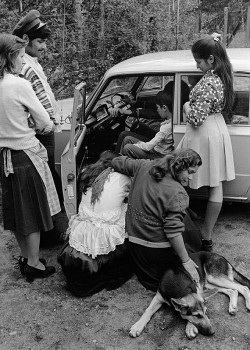
Romani teenagers, Kouvola, 1976. Photo: Mikko Savolainen
Photographer Mikko Savolainen began taking photos of Finnish Romani life in the 1960s, in the time of transition from nomadism to life in housing estates. New trends in the 1960s and 1970s also brought Romani culture to the fore – singers, musicians, festivals; an act baning racial discrimination had been passed. Savolainen became interested in Gypsy life
The text and the photographs are from Suomen romanit. Romanielämää 1960–1970-luvuilla / The Roma of Finland. Roma life in the 1960s and 1970s (Musta Taide, 2008. English translation: Jüri Kokkonen)
I have visited over a hundred Roma homes. Respect for parents, care of the elderly and hospitality are the first things that come to mind.
I have come across similar consideration for visitors only in cottages in Karelia, where the first question was whether I wanted a cup of coffee or to eat first.
I took my first photographs of Roma people in the Market Square of Hamina as an amateur photographer who only wanted to take good portraits. More…
The day peace came…
18 March 2015 | This 'n' that
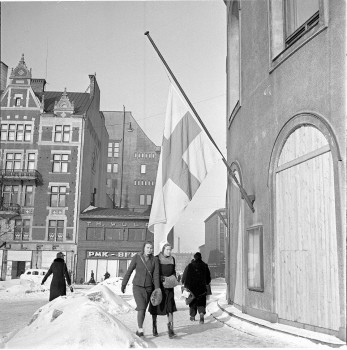
Flags fly at half-mast in Helsinki. Photo: SA-Kuva
Seventy-five years ago, in the period known as the Phony War, while the rest of the world was preparing to fight, it looked as if hostilities were over for one country.
In the preamble to the Second World War, Soviet Union had attacked Finland on 30 November 1939, demanding substantial border territories for the protection of Leningrad. Germany had invaded Poland, and France and Great Britain had declared war; but the Nazi invasions of Norway and Denmark, Italy’s entry into the war, the Battle of Britain, Pearl Harbor, D-Day, Hiroshima, Nagasaki and all the other horrors of the Second World War were yet to come.
As the world watched, ‘plucky little Finland’, massively outnumbered in terms of both men and equipment but superior in morale, organisation and knowledge of the terrain, managed to keep the Red Army at bay for months – far longer than anyone had expected. Eventually, however, the Russians overcame Finnish border defences and the war ended on 13 March 1940. Now generally regarded by Finns as a defensive victory – Finland was not occupied by the Soviet Union – the peace treaty nevertheless imposed a heavy burden on Finland, which lost extensive territories in Karelia to the south and Salla to the north.
In the event, the war was far from over for Finland, which still had the Continuation War (1941-44) and the Lapland War (1944-45) to fight. But for the moment, the country was once more at peace.
To mark the 75th anniversary of the end of the war, the Helsingin Sanomat newspaper has published a selection of photographs of the day peace came.
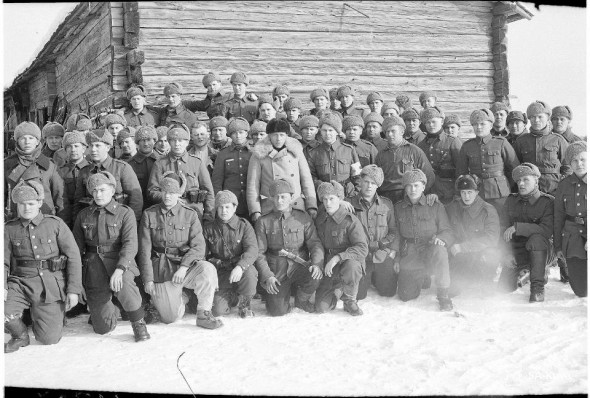
Soldiers of the 69th infantry regiment are able to eat in peace at last. Photo: SA-Kuva
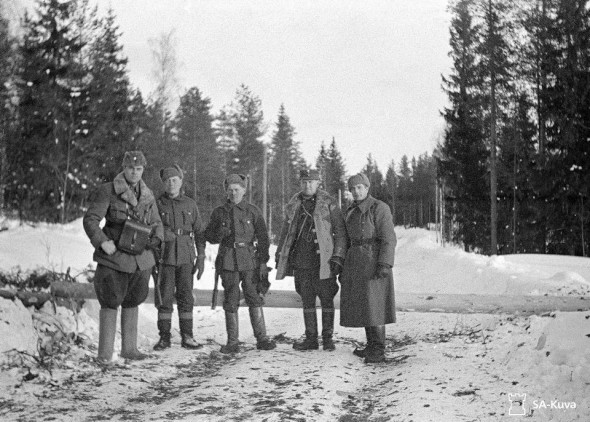
A tree felled across a road provides a makeshift border point. Photo: SA-Kuva
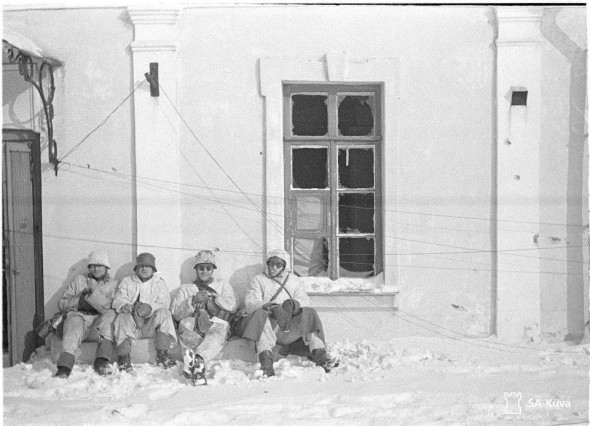
Soldiers in their white winter camouflage rest in Viipuri after peace is declared. Photo: SA-Kuva
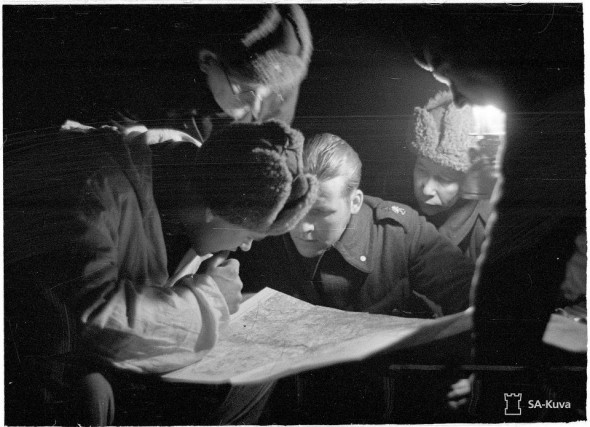
Soldiers in Kuhmo, north-eastern Finland, inspect the new border line. Photo: SA-Kuva
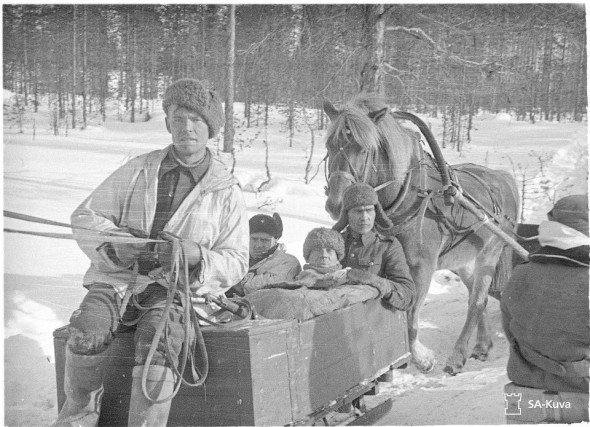
The last wounded soldiers are brought back by horse and cart from Saunajärvi. Photo: SA-Kuva
What the snail thought
30 September 2005 | Fiction, Prose
Poems from Tapahtui Tiitiäisen maassa
(‘It happened in Tumpkin land’, WSOY, 2004)
Illustrations by Christel Rönns

Meritähti
Eli merenpohjassa Meritähti
tuhat tonnia vettä yllä.
- Minä jaksan kyllä,
sanoi Meritähti.
- On terävät sakarat,
ja litteät pakarat
ja paineenkestävät kakarat!
Digging for gold
30 June 1989 | Archives online, Fiction, Prose
Antti Tuuri has found his theme in the life of Finnish émigré communities and their experience in what used to be called ‘the New World’. Uusi Jerusalem (‘The New Jerusalem’, 1988), is about the Finns who migrated to Canada during the Depression, only to find that their utopian dreams had no basis in reality. In the following extract the narrator finds himself and his fellow mineworkers in the middle of the forest at night, on the way by foot to the Kirkland Lake gold mines, where they are going to be strikebreakers. The novel, an ironical tale of life in a new land, follows on from Pohjanmaa (‘Ostrobothnia’, 1982), Talvisota (‘The Winter War’, 1984), Ameriikan raitti (‘The American road’, 1986).
The train pulled up at Swastika station, many a mile from Kirkland Lake, and Hamina said we’d have to press on by foot from the station to the town.
Swastika, he said, meant the crooked cross, but he didn’t know whether there were any of those German Adolf-fanciers around, who were so keen on the sign. He was certain, in fact, the town had got its name long before anyone in Germany had heard of Adolf or his swastika.
We asked why we had to walk from here to the town. Hamina said we’d got to walk because even in Canada vehicles didn’t drive through the backwoods; moreover, it wasn’t a good idea to walk along the Kirkland Lake road: we might meet up with the kind of guys who’d make our arrival at Kirkland Lake seem very unwelcome. More…
Dog
30 September 2002 | Archives online, Fiction, Prose
A short story from Afrikasta on paljon kertomatta (‘Much is still untold about Africa’, WSOY, 2002). Introduction by Maria Säntti
You’re exactly what a dog should be, I told him. You’ve a black ear and a white one. You’re not too big and you’re not all teeth.
I stroked his black-spotted coat. He wagged his curly tail.
I crouched down. He squeezed up against my chest. I sent my ball rolling along the stairway corridor. He shot after it, accidentally running over the top of it. As he braked, his claws screeched on the tiles. Sparks went flying.
He snapped the ball in his jaws, nibbled its plastic and sent it back with a snuffle. His tongue was wagging with glee. Next I wanted to roll the ball so he wouldn’t get it. It bumped against the iron banister and went off in a different direction, skidding under the dog’s belly. He turned and dashed after it. More…
Briefcase man
31 December 2000 | Archives online, Fiction, Prose
Extracts from the novel Aura (Otava, 2000). Introduction by Mervi Kantokorpi
He was born in the Russian Grand Duchy of Finland the year the world caught fire. He learned to read the year of the revolution, and spoke two languages as his mother tongue border – language and enemy language, as he often used to say. He was proud of only one of his languages; the other, he loved secretly. He spoke one loudly, the other softly, almost in a whisper.
At night, on the telephone, he spoke far away – you could see it, even in the dark, from his expression, his half-closed eyes sometimes breaking into song. It was so beautiful and soft that I wept under the blankets and hated myself because of the effect that language had on me.
Stinking tinker Karelian trickster Russian drinker, little Russky’s dancing in a leather skirt, skirt tears and oh! little Russky’s hurt.
Count to ten, he said. But count in Finnish. Or Swedish, that’ll baffle them. And if they call you a Swedish bastard, it’s not so bad. I’ve taught you the numbers in Arabic and Spanish, too, but I don’t think you’ll be able to remember them yet. More…
The Vatican
30 September 1986 | Archives online, Fiction, Prose
A short story from Maan ja veden välillä (‘Between land and water’, 1955). Introduction by Pirkko Alhoniemi
At the top of the hill there was a cow barn with all kinds of trash scattered along its walls: rusty pails, pottery shards, old shoes, all the stuff country people toss onto rubbish heaps. The clucking of chickens and bleating of sheep filled the air. As I was running across the barnyard I had an idea that a chicken had probably just laid an egg on the grass or was looking for some place to lay an egg, because it was letting out such sharp scolding cries.
Many of us were running across the yard and in back of the cow barn. If I hadn’t been on my way to the Vatican I would have stayed to pat a calf that was rubbing its side against a wall of the cow barn in the glow of the rising sun. But I was in a hurry. I didn’t dare let the women out of my sight because I couldn’t find the way by myself, I couldn’t even remember exactly where I had joined the crowd. I had just seen them running by and while I hadn’t intended to start off for the Vatican just that day, I went along with them anyway. More…
Still alive
31 March 2000 | Fiction, Prose
Extracts from the novel Maa ilman vettä (‘A world without water’, Tammi, 1999)
The window opened on to a sunny street. Nevertheless, there was a pungent, sickbed smell in the room. There were blue roses on a white background on the wallpaper and, on the long wall, three landscape watercolours of identical size: a sea-shore with cliffs, a mountain stream, mountaintops. The room was equipped with white furniture and a massive wooden table. The television had been lifted on to a stool so that it could be seen from the bed.
The bed had been shifted to the centre of the room with its head against the rose-wall, as in a hospital. Between white sheets, supported by a large pillow, Sofia Elena lay awake in a half-sitting position. More…
How I saved the world for communism
30 September 1996 | Archives online, Fiction, Prose
Extracts from the novel Kreisland (WSOY, 1996). Rosa Liksom’s first novel is a picaresque story of a heroine whose adventures range through Finland, Soviet Russia and America. Introduction by Soila Lehtonen
Maid Agafiina: Got myself some shiny black rubber boots, the kind with the red felt lining, and a colorful crepe de chine dress and a rayon coat, and while shopping for all that I checked out the four wonders of Moscow: a bell that doesn’t ring, a cannon you can’t fire, a ruler who doesn’t speak, and money that doesn’t stink.
In no time at all I made up a new personality, learned the language real good, and obtained a Soviet citizen’s passport. I was totally excited by everything I’d seen. My cheeks were as red as the flag. I wanted to find out about everything and see every achievement of this huge Soviet land. More…
The life of a lonely friend
30 September 1986 | Archives online, Fiction, Prose
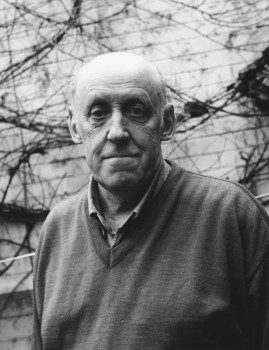
Bo Carpelan. Photo: Charlotta Boucht
Extracts from Bo Carpelan‘s novel Axel, ‘a fictional memoir’ (1986). In his preface to the novel Bo explains how he ‘found’ Axel.
Preface
In the 1930s I came across the name of Axel Carpelan (1858-1919), my paternal grandfather’s brother, in Karl Ekman’s Jean Sibelius and His Work (1935). In the bibliography, the author briefly mentions quotes from letters in the book addressed to Axel Carpelan, ‘who belonged to the Master’s most intimate circle of friends, and in musical matters was his constant confidant. Sibelius commemorated their friendship by dedicating his second symphony to him’. I had never heard Axel’s name mentioned in my own family.
Many years after Karl Ekman, the original incentive for the novel about Axel arose through Erik Tawaststjerna’s biography of Sibelius, in which Axel is portrayed in the second volume (1967) of the Finnish edition, and whose life came to an end in Part IV (1978). From early 1970s onwards, I started notes for Axel’s fictional diary from to 1919. It is not known whether Axel himself ever kept a diary. I relied as muchas possible on all the available facts. These increased when I was given access to letters exchanged between Axel and Janne from the year 1900 onwards. It became the story of the hidden strength a very lonely and sick man, and of a friendship in which the give and take both sides was far greater than Axel himself could ever have imagined.
Hagalund, June 1st, 1985
Bo Carpelan
![]()
1878, Axel’s diary
15.1.
On my twentieth birthday, I remember the young Wolfgang; ‘Little Wolfgang has no time to write because he has nothing to do. He wanders up and down the room like a dog troubled by flies’. However, that dog achieved a paradise. I have learnt yet one more piece of wisdom: ‘It is my habit to treat people as I find them; that is the most rewarding in the long run’. More…

